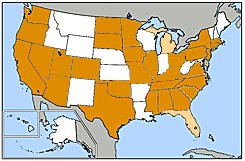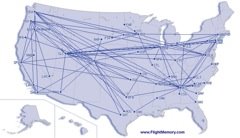Seattle, WA
3…2…1… Ignition… Blastoff! (Or whatever they say these days.) I’m heading to Space Camp! (In Alabama. In July.)
All the state teachers of the year (and about 20 international teachers) get to attend Space Camp in Huntsville, Alabama for a week. In July. (Temperature=Humidity. Which does occasionally happen in central Oregon, too. In January.)
I just stowed my carry-on bag for take-off, and it’s not a laptop bag this time. It’s an old backpack. Contents include: books, spiral notebook, energy bars, wallet, phone, Captain America suit. The usual stuff.

For the opening ceremonies of International Space Camp, all the teachers are supposed to wear a costume that represents their state or country. Since I’m the National Teacher of the Year, I’ve been informed that I must represent not just Oregon, but the entire country! After considering outfits such as Miss America (I do have nice legs,) a bald eagle (bald guy in an Eagle’s uniform,) or apple pi (bad math joke,) we decided to fork out a few bucks for the Captain America costume. It comes complete with sewn-in muscles and copious amounts of spandex. It’s a little bold, but I have to do it. Moral imperative. Jon says I might get to give the opening speech in my costume (which he knows nothing about, by the way, which is probably good.)

I did a little research on the good Captain, and found out that he was developed in the early 40’s to help defend America during WWII. Some wimpy dude couldn’t get into the armed forces because of his “weak constitution,” so he agreed to pilot an experimental government program in his personal quest to battle the Nazis. The experiment involved the use of a serum (naturally) and a blast of “vita-rays” (eat your vegetables, kids!) It worked, and wimpy dude became a specimen of human potential. He had no special powers, just the maximum possible attributes that a human could possibly attain: he could run a mile in just under a minute, alcohol could not intoxicate him (handy!) and I think he even stayed odor-free. (I’m not sure I’ll be able to pull that one off wearing a spandex suit in Alabama. In July.)
Ironically, the goal of this government experiment was to produce a superior breed of human beings who existed at the limits of human potential. No wonder they didn’t like the Nazis! Direct competition!
After all of my exhaustive research (and I read it on the internet, so it must be true!) I realized that my choice of costume was quite fitting (and tight fitting!) As great teachers always do, I will leave the analogy for you to fill in. It actually fits pretty good.
Just don’t scrutinize too closely. I am wearing spandex, after all.


















